Andrew’s Podcast: 50 WAYS TO SUCCEED AT WORK
A weekly podcast of 50 Ways to Succeed At Work for school leavers, Uni grads, anyone starting work and those who have worked for a few years. Each week’s episode ends with straightforward suggestions for action and is designed for easy listening. Episodes deal with work issues seldom mentioned in joining documentation, handbooks and other support material. Andrew’s wide-ranging work experience delivers help and insight for those wanting to succeed at work. Visit the website www.50ways.site to access the podcast transcripts and learn about e-learning courses. There’s also a book: Happiness At Work, visit www.myhappinessatwork.com.
A weekly podcast of 50 Ways to Succeed At Work for school leavers, Uni grads, anyone starting work and those who have worked for a few years. Each week’s episode ends with straightforward suggestions for action and is designed for easy listening. Episodes deal with work issues seldom mentioned in joining documentation, handbooks and other support material. Andrew’s wide-ranging work experience delivers help and insight for those wanting to succeed at work. Visit the website www.50ways.site to access the podcast transcripts and learn about e-learning courses. There’s also a book: Happiness At Work, visit www.myhappinessatwork.com.
Episodes
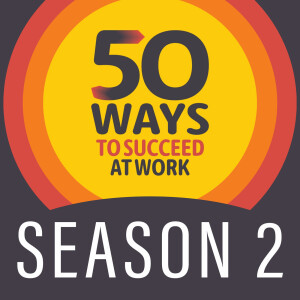
Monday Aug 14, 2023
E6/S2 CHIT CHAT CHUCKER - How constant gabbing may harm you
Monday Aug 14, 2023
Monday Aug 14, 2023
In today's episode, Andrew introduces the idea of you being a Chit Chat Chucker. That's someone who tackles constant gabbing at work, which can harm your chances of success.After a short mini playlet illustrating the impact of constant interruptions on performance, Andrew explores the three main concerns his research reveals people have about this topic.
"Why is chit-chatting at work bad?
How do I balance social chatting with work-distracting chit-chats?
My boss keeps chit-chatting and affecting my work performance."
After reviewing some of the evidence and practical suggestions about each of these, Andrew offers three essential actions you can take, plus a clear Takeaway.
Can't wait for Series 2 to run its course? Then buy Andrew's new book, published on Amazon, and there's also an Audio version.Further reading and videos: Andrew recommends some useful follow-through material which you can find for each episode at
www.myhappinessatwork.com/reading/categories/research-reading
and
www.myhappinessatwork.com/watch.BOOK:The 50 Ways to Succeed at Work book is a standalone companion to Andrew Leigh's weekly podcasts. It's an essential resource for all job starters and those at work for a few years. Dip in and out and take what seems helpful.
www.myhappinessatwork.com/book
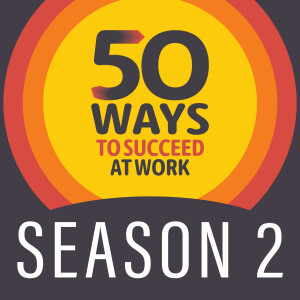
Monday Aug 07, 2023
Monday Aug 07, 2023
In a brief playlet, Andrew introduces why manners at work still matter. Next, he identifies the three main concerns people seem to have about the issue of manners at work."What do people mean by good manners work?How can good manners help my career?How should I respond if I keep encountering bad manners at work?"After making numerous suggestions in response to these important questions, Andrew ends the podcast with three basic actions you can take over manners at work, plus a simple Takeaway. It seems that two out of three executives and managers feel good manners at work affect a person's career.
Can't wait for Series 2 to run its course? Then buy Andrew's new book, published on Amazon, and there's also an Audio version.Further reading and videos: Andrew recommends some useful follow-through material which you can find for each episode at
www.myhappinessatwork.com/reading/categories/research-reading
and
www.myhappinessatwork.com/watch.BOOK:The 50 Ways to Succeed at Work book is a standalone companion to Andrew Leigh's weekly podcasts. It's an essential resource for all job starters and those at work for a few years. Dip in and out and take what seems helpful.
www.myhappinessatwork.com/book
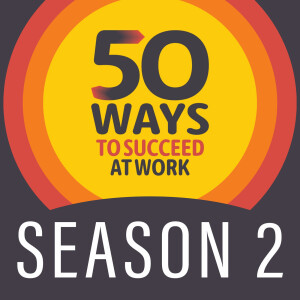
Monday Jul 31, 2023
E4/S2 NAME MAGNET - Why names matter and how to remember them
Monday Jul 31, 2023
Monday Jul 31, 2023
In this week's episode, Andrew explored why names at work matter and how to remember them. After a lively miniplay about name recall, Andrew identifies the three main questions people seem to have about this topic.
Why is it important to recall people's names at work
What's the best system for remembering people's names?
What if I lack the mental powers to remember names?
He then explores these with further suggestions. Such as not accepting that you don't have sufficient mental powers to recall names. What matters more is your intent--you must want to recall names. Also the importance of re-enforcement plus linked images to aid recall. The episode ends with the three practical action steps you can take on this critical work issue, together with a single significant Takeaway.
Can't wait for Series 2 to run its course? Then buy Andrew's new book, published on Amazon, and there's also an Audio version.Further reading and videos: Andrew recommends some useful follow-through material which you can find for each episode at
www.myhappinessatwork.com/reading/categories/research-reading
and
www.myhappinessatwork.com/watch.BOOK:The 50 Ways to Succeed at Work book is a standalone companion to Andrew Leigh's weekly podcasts. It's an essential resource for all job starters and those at work for a few years. Dip in and out and take what seems helpful.
www.myhappinessatwork.com/book
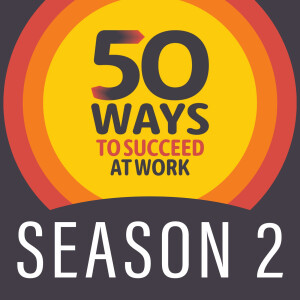
Monday Jul 24, 2023
E3/S2 CUT THE CUSS - Why inappropriate language can undermine your impact
Monday Jul 24, 2023
Monday Jul 24, 2023
Andrew explores the pros and cons of swearing at work in this episode. He explains that sometimes swearing can serve a useful purpose, helping to relieve tension.From research, Andrew suggests the evidence is that mainly swearing at work is counter-productive and can damage your career.He addresses the three main questions that people have about swearing at work
Can swearing at work harm my chances of success?
How do I control my swearing at work?
How do I deal with someone at work who keeps swearing?
The Podcast includes practical answers to these important questions. It ends with Andrew offering three highly practical action points and a single, powerful takeaway.
Can't wait for Series 2 to run its course? Then buy Andrew's new book, published on Amazon, and there's also an Audio version.Further reading and videos: Andrew recommends some useful follow-through material which you can find for each episode at
www.myhappinessatwork.com/reading/categories/research-reading
and
www.myhappinessatwork.com/watch.BOOK:The 50 Ways to Succeed at Work book is a standalone companion to Andrew Leigh's weekly podcasts. It's an essential resource for all job starters and those at work for a few years. Dip in and out and take what seems helpful.
www.myhappinessatwork.com/book
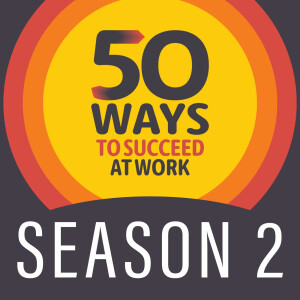
Monday Jul 17, 2023
E2/S2 GRAPEVINE AWARENESS - Run a mile from taking part in rumour and gossip
Monday Jul 17, 2023
Monday Jul 17, 2023
This podcast begins with a short playlet in which CEO Mason demands that his people start to travel economy class to save overheads. But a nasty rumour soon circulates suggesting that he still travels business class. Unsure what to do about it Mason consults the company's head of Public Relations who suggests a strategy for killing off the rumour by circulating a new one which seems to do the trickAndrew then explores three issues that people tend to have about organisational grapevines:
“What is a company grapevine, and how does it work.”
“Can I trust what I hear on the organisation’s grapevine?
”How do I deal with rumours and gossip at work?”
He ends the podcast with three practical actions you can take to deal with rumours and gossip at work. He offers a final takeaway:TAKEAWAY
At least 70% of all organisational communication comes through the grapevine. Strangely, most employees consider it trustworthy. Avoid gossip and rumours and preserve your reputation.
Can't wait for Series 2 to run its course? Then buy Andrew's new book, published on Amazon, and there's also an Audio version.Further reading and videos: Andrew recommends some useful follow-through material which you can find for each episode at
www.myhappinessatwork.com/reading/categories/research-reading
and
www.myhappinessatwork.com/watch.BOOK:The 50 Ways to Succeed at Work book is a standalone companion to Andrew Leigh's weekly podcasts. It's an essential resource for all job starters and those at work for a few years. Dip in and out and take what seems helpful.
www.myhappinessatwork.com/book
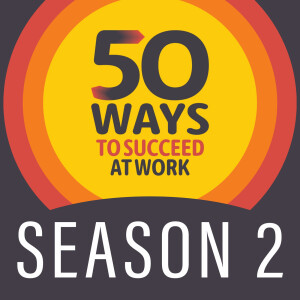
Monday Jul 10, 2023
Monday Jul 10, 2023
In Series 2, Andrew reaches for more depth in the 50 Ways to Succeed at Work.Many episodes are like mini playlets as Andrew conveys what produces success at work.Andrew identifies the three main questions that research suggests people have about this particular topic.
What are the right questions to ask at work?
What questions should I ask on my first day at work?
What questions should I ask my co-workers?
He offers practical suggestions of what to do about each of these questions,
The episode ends with three main action points, along with a highly practical Takeaway.
Can't wait for Series 2 to run its course? Then buy Andrew's new book, published on Amazon, and there's also an Audio version.Further reading and videos: Andrew recommends some useful follow-through material which you can find for each episode at
www.myhappinessatwork.com/reading/categories/research-reading
and
www.myhappinessatwork.com/watch.BOOK:The 50 Ways to Succeed at Work book is a standalone companion to Andrew Leigh's weekly podcasts. It's an essential resource for all job starters and those at work for a few years. Dip in and out and take what seems helpful.
www.myhappinessatwork.com/book
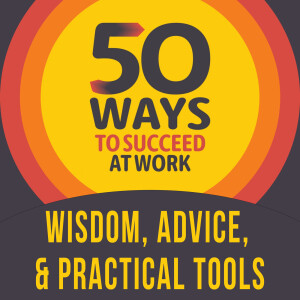
Monday Jun 19, 2023
Monday Jun 19, 2023
Integrity means that you live by a set of ethical and moral principles. These are so important that they cause you to do the right thing, no matter the circumstances. In this final Podcast in the series of 50 weekly episodes, Andrew explains why integrity is so critical to your success at work.Integrity is the best of you. It never gets lost, though it sometimes goes AWOL (absent without leave). When your integrity goes missing it means that you have lost sight of your moral compass. You get it back when you’re on the right path. It can be challenging to manage something as slippery as integrity at work. It’s one reason people may not talk much about integrity in even the best organisations. So, how do you make sense of integrity? The source says Andrew, is using your values to define what integrity means to you. They also mean taking responsibility and being accountable for your actions. That includes respecting yourself and others.
Most people you meet at work will be familiar with trust, honesty, and doing their best. So, feel free says Andrew to talk about them without feeling inhibited or worried that you're causing trouble. If you can’t talk about them, then integrity, yours and others are at risk.
As usual Andrew offers you three simple actions you can take to pursue integrity at work and he concludes with the takeaway:Integrity is the most critical behaviour you can show at work; it will build your reputation and personal brand and aid your search for success.
Can't wait for Series 2 to run its course? Then buy Andrew's new book, published on Amazon, and there's also an Audio version.Further reading and videos: Andrew recommends some useful follow-through material which you can find for each episode at
www.myhappinessatwork.com/reading/categories/research-reading
and
www.myhappinessatwork.com/watch.BOOK:The 50 Ways to Succeed at Work book is a standalone companion to Andrew Leigh's weekly podcasts. It's an essential resource for all job starters and those at work for a few years. Dip in and out and take what seems helpful.
www.myhappinessatwork.com/book

Monday Jun 12, 2023
Monday Jun 12, 2023
At work, should you boast or blow your horn like Muhammad Ali? Is that the best way to make people realise what a valuable contribution you’re making? Or is boasting at work wrong, even obnoxious?
Andrew starts this week's Episode on boasting at work with a reality check. He says, if you don’t tell people what you’re doing or the great work you’re achieving, how are they supposed to know?
Suppose a task needs your attention outside of regular working hours. Will your supervisor know that you’re doing this he asks?
Unless you share what’s happening, your senior colleague may never realise the extraordinary effort you’re making. It can therefore be a mistake and harm your chances of succeeding at work by not revealing that you’re going that extra mile.
Incidentally, if you haven’t already heard it, visit the Podcast website and listen to episode 37 on The Extra Mile. Its Ad free, and you may find it helpful.
Early on, we learn to refrain from boasting. Instead, we’re encouraged to be modest and urged not to blow our own horns. Widespread disapproval of self-praise may stem from a cultural bias. For example, Sweden is one of the most innovative countries globally. Yet its business culture deplores showing off. Sweden believes in “Keeping boasting to a minimum and finding a consensus, so everybody is on the same page."
That tells us something useful about the whole practice of blowing your own horn. There’s good boasting and unacceptable boasting. When or whether to blow your own horn needs to be carefully calibrated.
What makes boasting acceptable is when as human beings, we have an urge to be recognised and rewarded in some way for our efforts.
Most big achievements at work come from a team effort. This seldom depends on one talented individual. It can take a whole group working in concert to get something important done.
Sensible boasting at work is, therefore, best based on joint celebrations. Nobody claims more than their fair share of credits. It’s humanity rewarding itself with uncontrolled and heart-warming bragging about their achievements—something everyone can enjoy.
On the other hand, isn’t there something obnoxious about a colleague walking around with a smirk and a ‘know-it-all attitude? There’s a big difference between bragging and informing and between celebrating and boasting.
Bragging is talking yourself up, like a walking advertisement. You insist th
Can't wait for Series 2 to run its course? Then buy Andrew's new book, published on Amazon, and there's also an Audio version.Further reading and videos: Andrew recommends some useful follow-through material which you can find for each episode at
www.myhappinessatwork.com/reading/categories/research-reading
and
www.myhappinessatwork.com/watch.BOOK:The 50 Ways to Succeed at Work book is a standalone companion to Andrew Leigh's weekly podcasts. It's an essential resource for all job starters and those at work for a few years. Dip in and out and take what seems helpful.
www.myhappinessatwork.com/book

Monday Jun 05, 2023
Monday Jun 05, 2023
Andrew tackles this issue head-on and wonders why as a species able to put a human on the moon, create the Mona Lisa and invent vaccines we find it challenging to deliver outstanding customer service,
Even if you’re not in retail or selling, you need to think of yourself at work as someone there to give customer satisfaction, urges Andrew in today's podcast. He explains that your “customers” could be co-workers, another department or a demanding boss who wants everything by yesterday.
If you think of yourself as giving customer care, he says, you’re in the right place to burnish and grow your brand. That is, improve your work impact and build how others view you.
Providing excellent customer care is a terrific way to enhance your work profile. It can enable you to stand out from the crowd and help you move towards your goal of success at work.
Why does thinking of yourself as a customer carer help you achieve that goal? Because this kind of thinking rapidly makes you aware that an essential part of your work depends on people wanting more of what you do.
One aspect to which Andrew draws attention is how coming across well to your “customers” depends on developing reliable writing skills.
Everyone knows about spell checks. Yet most people, especially those starting work or having worked for a short time, often fail to apply them? Too often, that means shoddy documents, full of poor grammar and weak presentation.
Yet if you’ve come across Grammarly or Hemmingway Editor, you have two excellent writing tools at your fingertips.
Using one or both regularly can transform your performance. If you’re humble enough to know you should improve your writing skills, these two free programs alone can help build your brand.
Another customer service communication touchpoint is your impact on the phone and in virtual or real face-to-face meetings.
It’s easy to assume that you’re already good at these. When next you use Zoom or its equivalent, such as MS Teams, Andrew suggests that you click on the “record” function. Then check out how you come across.
Do you look interested in what people are saying? Or are you an expr
Can't wait for Series 2 to run its course? Then buy Andrew's new book, published on Amazon, and there's also an Audio version.Further reading and videos: Andrew recommends some useful follow-through material which you can find for each episode at
www.myhappinessatwork.com/reading/categories/research-reading
and
www.myhappinessatwork.com/watch.BOOK:The 50 Ways to Succeed at Work book is a standalone companion to Andrew Leigh's weekly podcasts. It's an essential resource for all job starters and those at work for a few years. Dip in and out and take what seems helpful.
www.myhappinessatwork.com/book

Monday May 22, 2023
Monday May 22, 2023
In this week's Podcast, Andrew explains that being approachable is critical to building good relationships with your colleagues. He explains that it underpins long-term success.
An approachable person is undefended. That means you are happy to break down barriers and build an environment of trust.
What exactly would that look like, asks Andrew? For instance, what would you see or not if you saw an undefended person? For a start, no grumpy looks, lack of eye contact, failure to smile, or show impatience.
You probably know the basics of being approachable. Still, Andrew takes you through the seven main indications to be sure:
Number 1 is you smile at people no matter their level in the organisation and invite them to interact with you.
Number 2, you make eye contact and encourage people to approach you.
Number 3, you show positive body language by being angled towards and not away from the other person.
Number 4, you look up from your work, desk or screen and give the other person your full attention.
Number 5 is you remain still rather than fidgeting, which sends negative signals.
Number 6, you often nod to show the other person they have your attention
Lastly, Number 7, you convey your positive outlook and readiness to engage.
Two other ways to be undefended are also worth your attention: showing empathy and compassion; and the technique of mirroring. These will be dealt with later in Series 2 of 50 Ways to Succeed, starting soon.
If you want to be a hit with your colleagues, says Andrew, some key personality traits can make you likeable in the workplace. These include being positive, approachable and having a sense of humour.
The evidence suggests that two out of three workers feel disliked people struggle to get ahead at work.
As with all Andrew's weekly podcasts, this one ends with him offering you three action points you can pursue immediately. Together they can help you to become more approachable at work.
You'll also learn how to obtain the relevant e-learning mobile unit to consolidate your learning further.All 50 Ways podcasts end with three actions you can take today to do better.COMING SOON!
Customer Carer: Focusing on customer service is a sure way to gain confidence.
Horn Blower: Demonstrate how you add value and why modesty can backfire.
Integrity Wins: Showing integrity is a sure way to build your reputation.
Can't wait for Series 2 to run its course? Then buy Andrew's new book, published on Amazon, and there's also an Audio version.Further reading and videos: Andrew recommends some useful follow-through material which you can find for each episode at
www.myhappinessatwork.com/reading/categories/research-reading
and
www.myhappinessatwork.com/watch.BOOK:The 50 Ways to Succeed at Work book is a standalone companion to Andrew Leigh's weekly podcasts. It's an essential resource for all job starters and those at work for a few years. Dip in and out and take what seems helpful.
www.myhappinessatwork.com/book

Available now on Amazon!
An essential resource for all job starters and those at work for a few years.
Paperback - Black & White Interior Pages
Paperback - Full Colour Interior Pages Perfect for Gift
Kindle edition FREE with Kindle Unlimited




